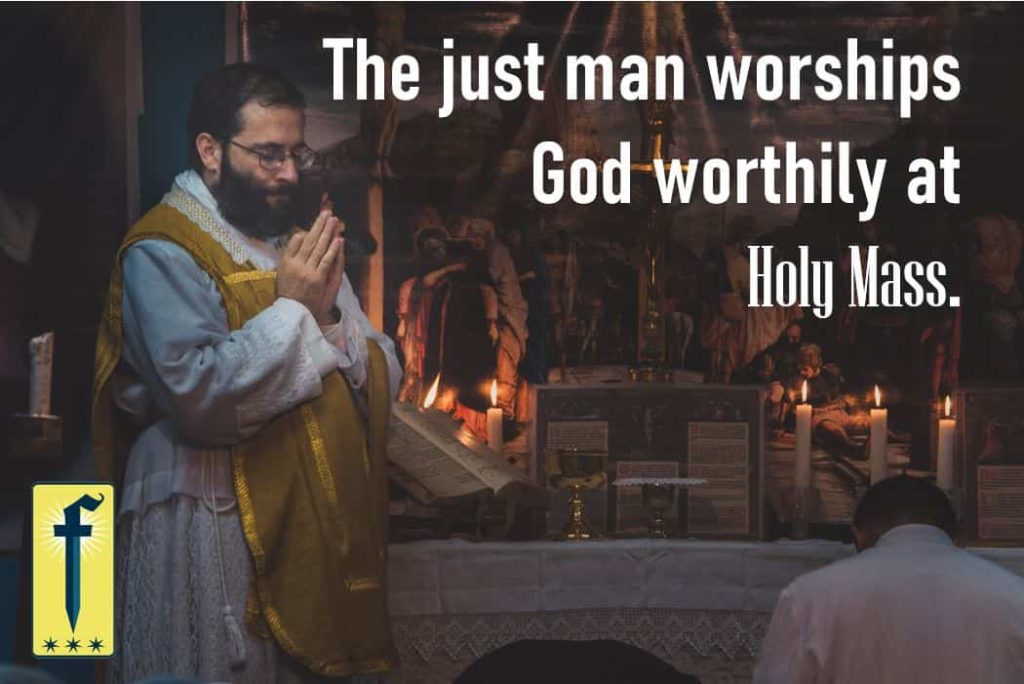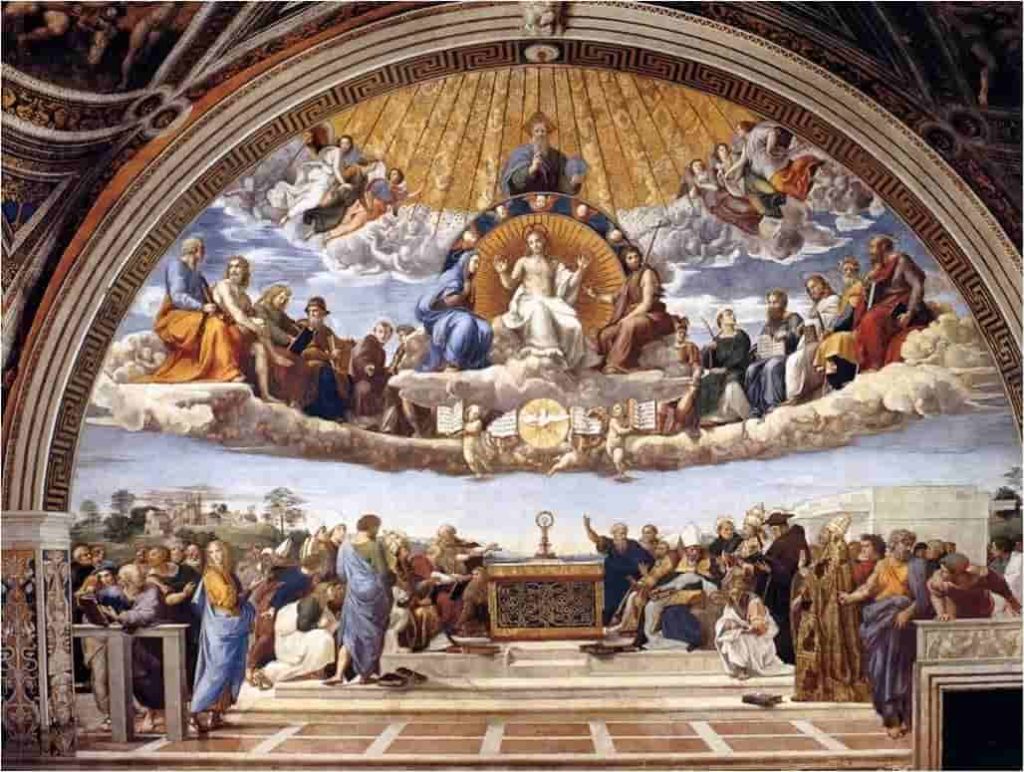The Just Man Worships God Worthily at Holy Mass

Communion only reaches its true depths when it is supported and surrounded by adoration. The Eucharistic Presence in the tabernacle does not set another view of the Eucharist alongside or against the Eucharistic celebration, but simply signifies its complete fulfillment (Joseph Ratzinger, The Spirit of the Liturgy, 90).
ADORATION AND COMMUNION
- by Thomas Connelly
There are probably hundreds of beautiful things to reflect on and pull from the liturgy but we are going to try to narrow down a few here. Most of these reflections are based around points that Ratzinger makes in his book, The Spirit of the Liturgy.
Religion
Religion and the way it is manifested in worship and the liturgy is giving God what is due to him. This is why acts of the virtue of religion are a matter of justice – we owe God. We can try to do this on our own but doesn’t it make sense to worship God in the way that he asks us to? He is going to be the best judge of what is appropriate. We have received everything as a gift and the only true justice is for us to give everything back to God. He doesn’t want our money, he doesn’t want our talents, and he doesn’t want our body. He wants you, all of you.
There is a term in the Philosophy of St. Thomas Aquinas that uses two words, exitus and reditus. Loosely they mean going out and returning. This is seen all over the place in nature. A seed goes out away from the tree and falls to the ground but then it in turn grows up as a tree and we are back to where we started. In the liturgy we have been created by God, exitus, and the liturgy is our way of turning back to him, reditus. It starts in God and ends in him.
Time
“Yesterday is history, tomorrow is a mystery, all you have is today, that is why it is called the present” (Ugway from Kung Fu Panda) This is one of the fascinating things about the mass: it is time travel. We are not just remembering an event that happened thousands of years ago. We are living it in the present. There is the historic event of Christ’s death in the past. But it is made present to us now in the mass. At the Easter Vigil we say “THIS is the night…” We don’t say, “Remember that holy night…” The mass also points us to the future in an eschatological way, pointing to the end of time, because Christ’s sacrifice is in the present all through time.
Also fascinating is that during the mass heaven and earth collide. The vertical axis and the horizontal axis intersect. There is a beautiful image from Raphael in the Vatican Museums that depicts this:

We see the horizontal which is the earth and human beings who are locked in this passage of time, then we have the vertical line that ascends to heaven with the Blessed Trinity. Not only that but the angels are present at the mass as well, choirs and choirs of them. We remember this specifically when we sing the Sanctus (Holy, Holy, Holy…).
Also interesting, when the vertical and the horizontal intersect they create a cross.
Another point that Ratzinger mentions is the mass as play. This may sound crazy at first but when we look at when we are at play we step out of time to a certain degree. We don’t care about the passage of time because we are enjoying ourselves. This is also what happens at mass, we step out of time in a certain sense. This is why we must set aside all earthly cares.
Oriens
Christ, in the “O” antiphons, which are traditionally sung in the days leading up to Christmas, is called the Dayspring, or the Rising Sun, Oriens. This is significant at Christmas because it is the turning point in the year when we have passed the darkest day of the year and the sun begins to conquer the sky again and our days grow longer and longer.
Ratzinger, in The Spirit of the Liturgy, talks about how “The turning of the priest toward the people has turned the community into a self-enclosed circle” (80). We can focus so much on being a community that we forget it is God that brings us together. Traditionally, Christians “did not close themselves into a circle; they did not gaze at one another; but as the pilgrim People of God they set off for the Oriens, for the Christ who comes to meet us “(80). Christ, in the opening chapter of the gospel of John is called the “true light, which enlightens everyone.” (Jn 1:9) But my favorite line in all the gospels is one that comes just before that. “The light shines in the darkness, and the darkness did not overcome it.” (Jn 1:5) Darkness has no power over the light. It cannot overcome it. Light is also mysterious, even on a physical level. We don’t know whether it is a particle or a wave, it has aspects of both. We know that the speed of light is the fastest thing in the universe, but we have no idea how it travels as fast as it does, and how it never slows down or speeds up.
Mystery
There is a daunting mystery in the liturgy. Which I think is entirely appropriate. In today’s world we want to understand everything and know all the ins and outs. With God, we will never know more than a drop in the ocean of who he is. The symbolism and the incense and the physical aspects of the liturgy veil some things but they also reveal some. This reflects in a beautiful way the mystery of God. We can see him in certain things but we never fully grasp who he is.
What we can know for sure, however, that we go to worship because it is right and just.
And from the classic Calvary and the Mass by Ven. Fulton J. Sheen:
The most sublime act in the history of Christ was His Death. Death is always important for it seals a destiny. Any dying man is a scene. Any dying scene is a sacred place. That is why the great literature of the past which has touched on the emotions surrounding death has never passed out of date. But of all deaths in the record of man, none was more important than the Death of Christ. Everyone else who was ever born into the world, came into it to live; our Lord came into it to die. Death was a stumbling block to the life of Socrates, but it was the crown to the life of Christ. He Himself told us that He came “to give his life a redemption for many”; that no one could take away His Life; but He would lay it down of Himself.
If then Death was the supreme moment for which Christ lived, it was therefore the one thing He wished to have remembered. He did not ask that men should write down His Words into a Scripture; He did not ask that His kindness to the poor should be recorded in history; but He did ask that men remember His Death. And in order that its memory might not be any haphazard narrative on the part of men, He Himself instituted the precise way it should be recalled.
…
The Church which Christ founded has not only preserved the Word He spoke, and the wonders He wrought; it has also taken Him seriously when He said: “Do this for a commemoration of me.” And that action whereby we re-enact His Death on the Cross is the Sacrifice of the Mass, in which we do as a memorial what He did at the Last Supper as the prefiguration of His Passion.2
Hence the Mass is to us the crowning act of Christian worship. A pulpit in which the words of our Lord are repeated does not unite us to Him; a choir in which sweet sentiments are sung brings us no closer to His Cross than to His garments. A temple without an altar of sacrifice is non-existent among primitive peoples, and is meaningless among Christians. And so in the Catholic Church the altar, and not the pulpit or the choir or the organ, is the center of worship, for there is re-enacted the memorial of His Passion. Its value does not depend on him who says it, or on him who hears it; it depends on Him who is the One High Priest and Victim, Jesus Christ our Lord. With Him we are united, in spite of our nothingness; in a certain sense, we lose our individuality for the time being; we unite our intellect and our will, our heart and our soul, our body and our blood, so intimately with Christ, that the Heavenly Father sees not so much us with our imperfection, but rather sees us in Him, the Beloved Son in whom He is well pleased. The Mass is for that reason the greatest event in the history of mankind; the only Holy Act which keeps the wrath of God from a sinful world, because it holds the Cross between heaven and earth, thus renewing that decisive moment when our sad and tragic humanity journeyed suddenly forth to the fullness of supernatural life.
2135 “You shall worship the Lord your God” (Mt 4:10). Adoring God, praying to him, offering him the worship that belongs to him, fulfilling the promises and vows made to him are acts of the virtue of religion which fall under obedience to the first commandment.
Share This Post


